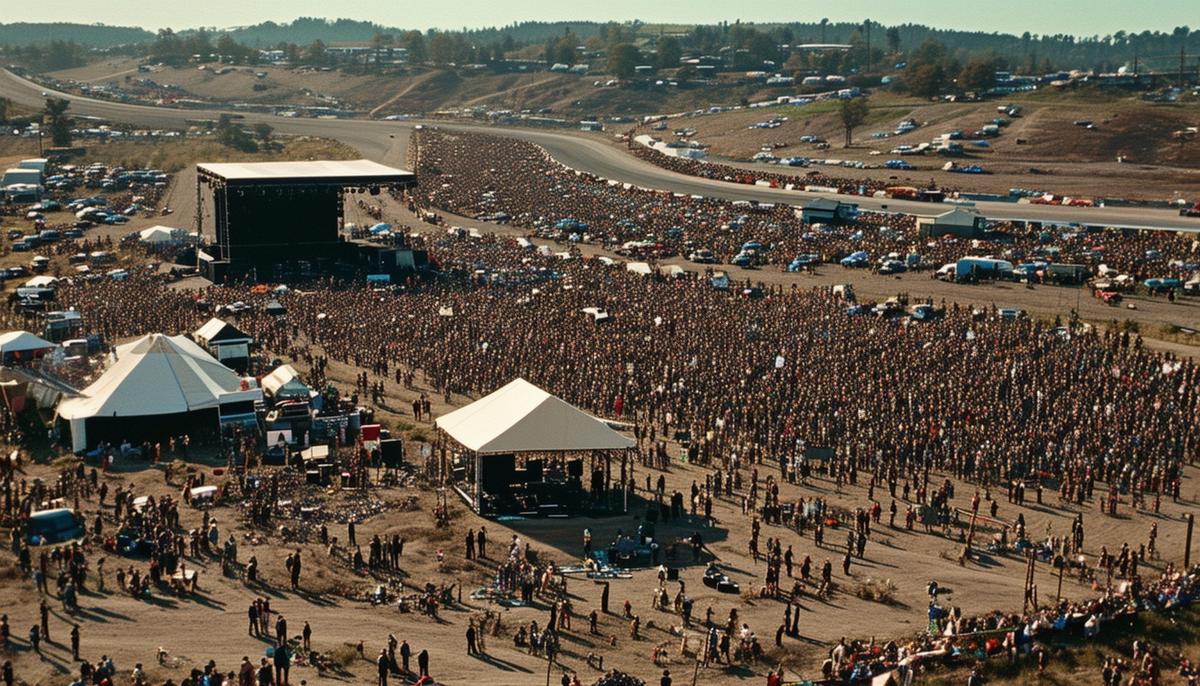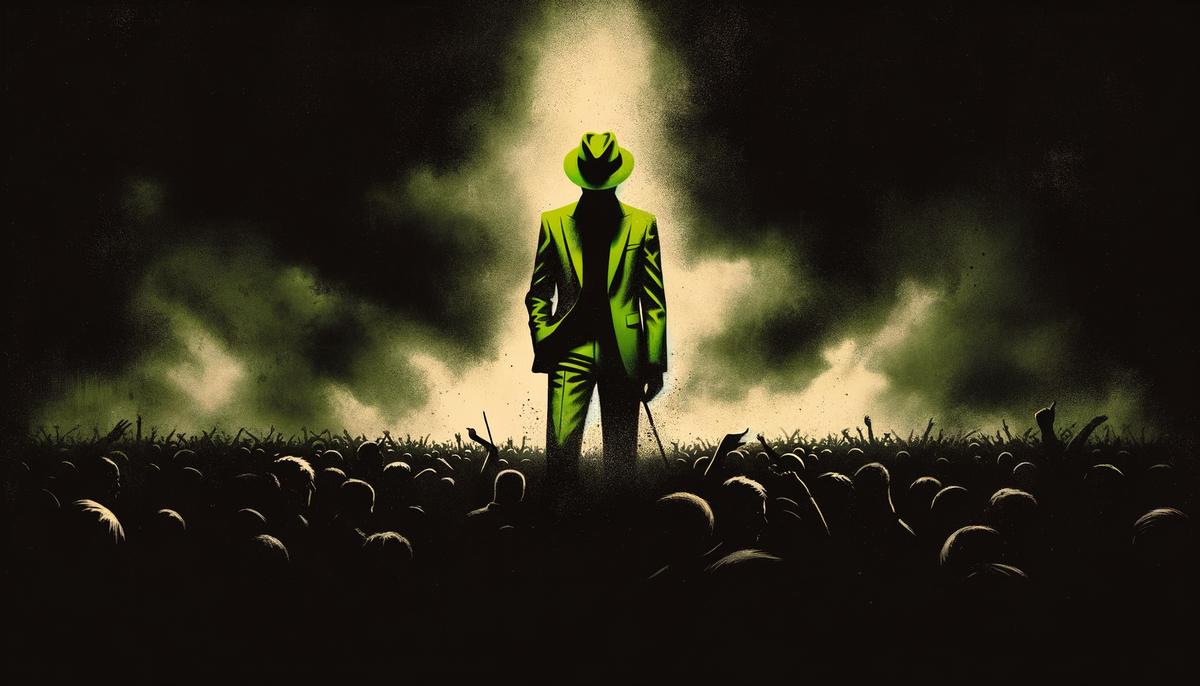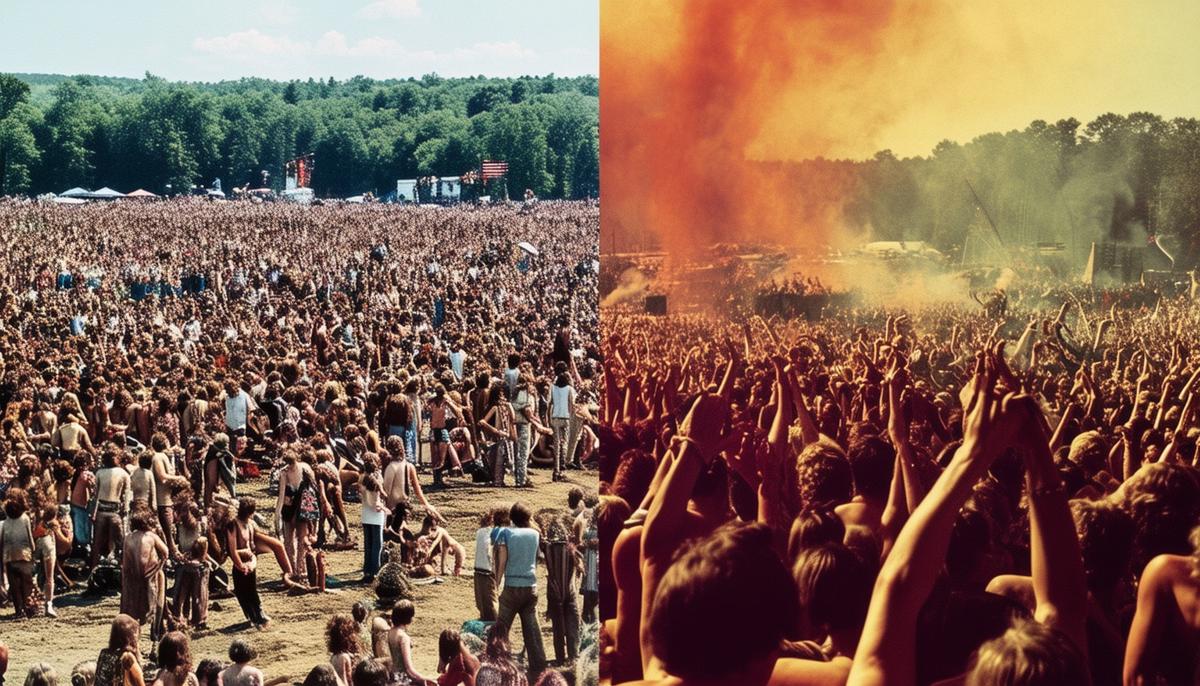Event Planning and Execution
The Altamont Free Concert on December 6, 1969, showed how wild things can get when planning goes out the window. The Rolling Stones had to switch venues twice, finally landing at Altamont Speedway – a barren raceway miles from civilization. Not exactly prime real estate for 300,000 fans!
The organizers dropped the ball on basics like staging and sound. The stage was so low you could hop on it, and the sound system was about as effective as shouting through a megaphone. For security, they hired the Hells Angels, luring them with $500 worth of beer. Talk about a recipe for disaster!
The day was a total trip, man. Bad acid was everywhere, and even some bands bailed. The Grateful Dead took one look and split, leaving their fans hanging. The lineup still rocked with Santana and Jefferson Airplane, leading up to the Stones. But things got heavy when Meredith Hunter, decked out in a lime green suit, got caught up in the mayhem and tragically lost his life in a scuffle with the Hells Angels.
The Stones kept playing, thinking stopping would make things worse. They belted out hits through the chaos, trying to salvage some rock spirit from the mess.
Altamont was supposed to be Woodstock West but ended up more like a bad acid flashback. It was a harsh reminder that you can't just wing it when it comes to massive concerts, no matter how groovy your intentions are.

Role of the Hells Angels
Picking the Hells Angels for security was like asking wolves to watch sheep – bound to get messy. The Stones, probably thinking of their chill London concert with local bikers, expected the same mellow vibe from the California Angels. Boy, were they in for a shock!
These weren't your flower power types. The Angels rolled in with pool cues instead of peace signs, ready to crack skulls rather than spread love. They turned the stage into their personal turf, deciding who got close and who got clobbered.
The crowd got a front-row seat to some unplanned violence, with even Jefferson Airplane's Marty Balin catching a fist to the face. It was punk rock security before punk was even a thing – all aggression, no chill.
When the dust settled, everyone from the media to the hippies was pointing fingers at the Angels. It was a harsh lesson that sometimes the wildest cats aren't the best choice for keeping the peace, no matter how rock and roll they might seem.

The Death of Meredith Hunter
Meredith Hunter's death was the darkest moment of Altamont. This 18-year-old in a flashy lime green suit got caught in the crossfire between the crowd and the Hells Angels. As things heated up, Hunter pulled a gun, probably scared out of his mind. But that move sealed his fate.
Alan Passaro, one of the Angels, reacted with a knife, and just like that, Hunter was gone. Passaro later got off on self-defense, but the damage was done. Hunter's death became the grim exclamation point on Altamont's chaos.
This tragedy shook the foundations of the peace and love generation. It was a wake-up call that sometimes, inviting danger to the party can have real, irreversible consequences. Hunter's lime green suit became a symbol of innocence lost in a sea of bad decisions and worse vibes.

Impact on the Rolling Stones
Altamont hit the Stones like a bad hangover. What was supposed to be their crowning counterculture moment turned into a PR nightmare. Critics and fans alike were all over them, questioning every choice that led to the disaster.
But the Stones, being the Stones, didn't stay down for long. They took the hit and used it to evolve. They got serious about concert planning, making sure future gigs were tight and professional – but still with that rock and roll edge.
The tragedy seeped into their music, too. Songs like "Gimme Shelter" took on a heavier meaning, reflecting the darkness they'd brushed up against. The band grew up fast, realizing that with great power comes great responsibility (or something like that).
Years later, the Stones look back on Altamont as a brutal lesson learned. Keith Richards admits they couldn't have called it off without risking more chaos, while Mick Jagger used the experience to sharpen his frontman skills.
In the end, Altamont didn't break the Stones – it made them stronger. They took that nightmare and turned it into fuel for a career that's outlasted pretty much everyone. Talk about turning lemons into rock and roll lemonade!
Cultural and Historical Significance
The Altamont Free Concert was a pivotal moment in 1960s counterculture. Billed as the "Woodstock of the West," it aimed to bring 300,000 people together to celebrate peace, love, and rock 'n' roll. However, the event quickly spiraled into chaos, becoming a stark contrast to the idealistic vision of its organizers.
Rather than capping off a decade of activism and free love on a high note, Altamont became a sobering reality check. It exposed the cracks in the counterculture movement and signaled the fading of 1960s optimism. The concert's rapid descent into violence and disorder shattered the romantic notions of peace and harmony that had defined the era.
Key Factors Contributing to the Chaos:
- Poor planning and last-minute venue changes
- Inadequate facilities and security
- Hiring of Hells Angels as security guards
- Widespread drug use and intoxication
- Overcrowding and lack of crowd control
In the aftermath, Altamont was often portrayed as "the day the music died" or the symbolic end of the '60s dream. While Woodstock had embodied peace and unity, Altamont ripped away that facade, revealing the potential for chaos when high hopes collide with harsh realities.
"It was just completely barbaric… I've just never seen anything like it before. I just couldn't believe it." – Mick Taylor, Rolling Stones guitarist
The concert's legacy extends beyond its immediate impact. It became a cautionary tale for future generations of musicians and event organizers, highlighting the importance of proper planning and security measures. Altamont fundamentally changed how music festivals were organized, moving away from the free-for-all "love-in" model to more structured and professionally managed events.
Despite its dark reputation, Altamont wasn't just about tragedy. It served as a cultural mirror, reflecting the tensions and contradictions of American society at the time. The event became a turning point in rock history, forcing the music industry and fans alike to confront uncomfortable truths about the limits of idealism in the face of human nature.
In the long run, Altamont's impact on music and culture was profound. While it marked the end of an era in many ways, it also proved the resilience of rock 'n' roll. The music world emerged from Altamont chastened but determined, ready to evolve and adapt to the changing times. The dream of the '60s may have collided with reality at Altamont, but music continued to be a powerful force for expression and social change in the decades that followed.

Altamont's legacy serves as a stark reminder of the delicate balance between idealism and practicality. It underscores the critical importance of thoughtful planning and preparation in large-scale events. Moreover, it highlights the unpredictable nature of human behavior in mass gatherings. The lessons learned from Altamont continue to influence event management and security practices today, urging organizers to prioritize safety while still preserving the spirit of music and community.
As we reflect on Altamont, it's crucial to recognize both its tragic elements and its role in shaping the future of live music events. By learning from the past, we can strive to create safer, more inclusive spaces for artistic expression and communal celebration. The spirit of music as a unifying force remains alive, tempered by the wisdom gained from experiences like Altamont.
